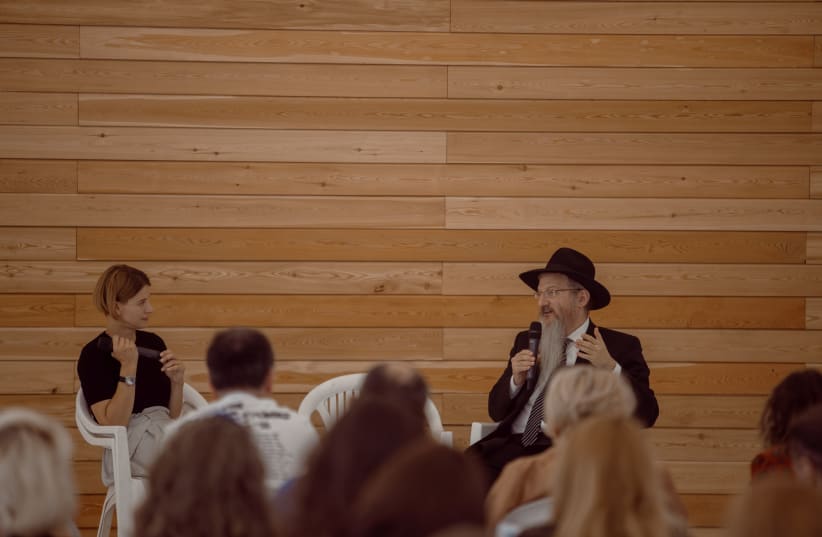On Sunday, May 23, some 1,000 Moscow Jews attended the first Limmud FSU face-to-face event since the start of the worldwide coronavirus pandemic lockdowns. The one-day event was held in a specially designed open-air format adapted to Moscow’s social distancing regulations; each session was for a limited number of participants, and most of the sessions took place in the open air in Moscow’s Admiral Club. More of a Jewish learning festival than a conference, the sessions were interactive in nature – between the presenter and the audience, or between two or more speakers – and covered such varied topics as Jewish history and culture, business development, education, and culinary arts alongside musical performances.
Participants were delighted to return to face-to-face programming. For Viktoria, age 27, it “felt like a true return to normal life after such a difficult year. It was great to meet people again, to feel the atmosphere, to learn together. I think that the entire world has learned not to take things for granted, and that made this event feel special and particularly significant.”
Among the speakers was Russia’s chief rabbi, Berel Lazar, who discussed the situation of Jews in the world today; journalist Alexei Venediktov, on “Russian Federation: Imperialism or Nationalism,” and Yiddishists Anna Ginzburg-Paley and Anna Smirnitskaya, who talked about how a woman’s view of herself changed over the past 100 years with particular reference to Yiddish poetry and song and how, in the ghettos, women’s voices revived hope. A series of sessions discussed the corona era – its impact on doctor-patient relations, the issue of wearing masks and self-isolation – alongside sessions on British beer and Israeli wines and a cooking demonstration. There was a special program for children and a tent where 20 contemporary Jewish films were screened.
In his remarks, Rabbi Lazar discussed the recent conflict between Israel and Hamas in the Gaza Strip but argued that the real problem facing the country is its internal conflicts. “How can it be that in Israel you have to be either religious or not religious?... You have to belong to one camp or another; if you don’t belong to one camp, you are no one.”
The event was also addressed by Israel’s ambassador to Russia, Alexander Ben Zvi, who, reflecting on the fact that this event is the first post-corona Limmud event of any group, anywhere in the world, said: “You see thousands of young people who are interested in what Limmud is, in their Jewish roots, in their culture, in their religion, in politics – it makes you actually proud.”
Marina Yudborovsky, CEO of the Genesis Philanthropy Group (GPG), said: “For Russian-speaking Jews, culture and community have long been the cornerstone to reclaiming and developing our Jewish identity. From its inception 15 years ago, Limmud FSU has been a flagship initiative in this regard, bringing thousands of RSJ worldwide to the next step of their Jewish journey. It is only fitting that, as the Jewish world emerges from the pandemic, Limmud FSU comes alive in Moscow, where it all began.”
Summing up the day, 30-year old participant Alex remarked, “It was an exceptional Limmud FSU Moscow event, in a new place, with a special atmosphere, and even though this year it could only be a one-day event and not a full three-day conference, it was a refreshing and interesting experience. With only the sky above us, it had everything we have come to love at Limmud FSU Moscow – fascinating lectures by the best lecturers, great people to meet and talk to, and a special ambiance.”
Since the first conference in Moscow 15 years ago, over 75 events have been mounted by 13 volunteer teams, and Limmud FSU events, led by the organization’s chair, Matthew Bronfman, and president, Aaron G. Frenkel, have reached out over these years to some 70,000 Russian-speaking Jews across the globe.
Supporters of the event included Genesis Philanthropy Group, Claims Conference, Jewish National Fund (KKL), The American Jewish Joint Distribution Committee, Prime Minister’s Office - “Nativ” and more.
